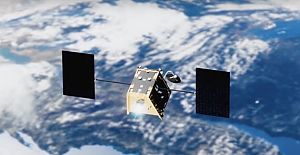500th satellite with thermal protection from Austria

Today, Thursday evening, 10 February, the next 34 small internet satellites of the British-Indian company OneWeb will be launched into space. This brings the number of OneWeb small satellites in space to 428. The satellite fleet brings fast internet to remote regions of the world. "This means that there are more than 500 satellites in space, which our thermal insulation protects from the extreme cold and heat in space of minus 150°C to plus 150°C on average," emphasises Manfred Sust, Managing Director of RUAG Space Austria, Austria's largest space company. There are currently about 5000 active satellites in space, which means that about every tenth satellite is protected by thermal protection from Austria.
The OneWeb satellites will be launched into space on Thursday evening from the European Spaceport in Kourou, French Guiana, South America.
Thermal protection for environmental and climate satellites
In addition to these OneWeb Internet satellites, thermal protection from Austria protects almost all satellites of the European Space Agency ESA. "From environmental and climate satellites that observe our Earth every day to highly complex space probes to Mercury or the Sun, for example," Sust emphasises. Almost all European Sentinel environmental satellites protect thermal insulation from the Alpine Republic. Space technology "made in Austria" also provides heat protection for the Mercury probe "BepiColombo". "Mercury is the closest planet to the sun, so the probe has to withstand extreme heat of over 450 degrees Celsius," explains Manfred Sust. In this case, the thermal insulation is made of ceramic fibres on the outside and also serves as protection against micrometeorites.
Heat protection for solar probe
The "Solar Orbiter" space probe from ESA and NASA will analyse the solar wind and will also be protected by thermal insulation from Austria. "The satellite will come very close to the sun. The requirements for heat protection are correspondingly high," explains Manfred Sust. A special shield on the sunny side protects the satellite from most of this enormous heat load by shading it. Behind this shield made by an outside company, RUAG Space takes care of cooling the probe: "The entire satellite is wrapped in thermal insulation from Austria," says Sust. "Our thermal insulation can withstand temperatures of around 200 degrees Celsius."
30 years of experience
RUAG Space has been producing the thermal protection for all these satellites for more than 30 years in Berndorf in the Triesting Valley in Lower Austria. The insulation usually consists of several layers of metal-coated plastic foils. "Depending on the mission, however, other materials are also used," adds Sust. Around 20 people are employed at the Berndorf site.
